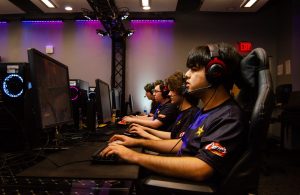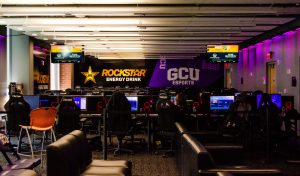- Slug: Sports-GCU Esports Growth, 1,090 words.
- 2 photos available
By Sammy Nute
Cronkite News
PHOENIX – In 2019, ESPN hosted the inaugural Overwatch College Esports Championship, matching up the country’s best universities for an Overwatch tournament. Airing on one of the nation’s biggest sports networks was a huge moment for college esports, but the event was the start of an esports culture shift in the Valley.
That year marked a rare opportunity for a university that joined Division I sports just six years earlier in 2019.
“ESPN picked up the tournament, and as a result, GCU Esports was featured on ESPN for the whole world to see, including the president of GCU,” GCU esports operations supervisor Tyler Galvin said. “That success of a relatively small club at GCU earned a major commitment from the university to help our program continue to grow.”
The early support for esports shown by the GCU faculty and staff has blossomed into arguably the strongest community on campus, said GCU esports director Jay DeShong. GCU is home to an esports lounge on campus, which takes up the entire second floor of the technology building. In a 3200-square-foot room, GCU has invested thousands of dollars in over 72 gaming PC setups, along with six TVs dedicated to console play on Playstation, Xbox or Nintendo Switch.
The massive space can cater to not only the competitive gamers but also the casual gamers, – a decision that has been a huge success. The lounge now plays host to daily events in an attempt to get isolated gamers who play by themselves in their dorm rooms to engage in their community.
GCU’s esports community had around 500 members when the renovated space opened in 2019, according to the school. In 2024, the community has grown to 2,000 active gamers.
“You can ask any of our 2,000 members, and they’ll tell you it’s a second home to them,” DeShong said. “Especially the workers and especially people who are here more than one day a week to play video games. It’s a home for everybody. It’s one for me, it’s a home for my staff. It’s a second home.”
A key reason for the lounge’s success is creating a “second home” for everybody, women on campus. DeShong and his staff have created a program titled “Women’s Wednesday.” Every two weeks, the lounge opens its doors for women only from 6 p.m. to midnight. As a result, the percentage of female members jumped from 1% of the club to 25%.
“It’s beautiful for everybody who likes video games on some level to be able to get together and talk about the things that they love,” DeShong said. “Whether it’s video games, whether it’s what’s going on in the news, whether it’s what they’re talking about on social media, whatever it is, we all share the common theme of gaming, and that allows us to kind of get to know each other better.”
While the casual community is strong, GCU still values the competitive side of esports. In mid-March, the Lopes hosted the inaugural Western Cactus League Tournament. The WCL was the first time Arizona’s four major universities – GCU, ASU, Arizona and NAU – played an in-person LAN Tournament.
The schools competed in four games – Overwatch, Valorant, Super Smash Bros Ultimate and Rocket League – with the winner of each tournament qualifying for Collegiate Esports Commissioner’s Cup 2024, a national LAN tournament also known as May Madness.
“In order for esports to grow, especially collegiate esports, the scene is at a point where, yes, other schools are technically our rivals,” DeShong said. “We’re all going to compete to be the best in Arizona, obviously. But it’s also important for us to have this event where everyone gets that level so we can all grow together.”
The WCL is just the beginning of what DeShong thinks could be an esports consortium in Arizona, starting at the top with the major universities and trickling down to local junior high and high school events.
However, if that consortium ever comes together, it will need more schools at the top. GCU has changed the esports game with its early entry, and other schools are catching up.
“Esports is number two to basketball for reasons why students come to GCU, and you can imagine what that means for us,” DeShong said.
Arizona State is on its way to joining GCU as another elite esports program in the state after its performance at the WCL tournament. The Sun Devils entered the tournament as the No. 6 ranked team in the country, according to the Overwatch College Ranking Association. ASU earned three dominant sweeps to guarantee its spot at May Madness, a National Overwatch Competition held in Dallas Texas at the beginning of May.
However, the Sun Devils succeeded without the same support and funding as GCU. GCU has the advantage of being a private school, resulting in more accessible funds for clubs like esports. ASU does have an esports lounge, but the ASU esports teams have run into trouble consistently booking for practices and events.
Despite the challenges, the Sun Devils believe they can become the powerhouse to lead Arizona and Southwest esports.
“I feel like it comes down to, ‘Well, you guys are already successful, so why invest more into something if you’re already doing well,’” ASU Overwatch competitive director Asad Jamal said. “But for me, it’s that level of pride that as a school, if we had funding, I have no doubt in my mind that we could instantly be the number one school in esports.”
Without an athletic director in place and a move to the Big-12 on the horizon, the Sun Devil athletics department might have too much on its plate to organize funding for ASU’s esports program, but proof of the concept is across town in Phoenix.
GCU has created an amazing community full of contributing students being brought together by a love of gaming largely because of the school’s early commitment but the task was far from easy.
“Esports can be a daunting commitment for a lot of universities because very few have the necessary expertise to run their program at a high level,” Galvin said. “When done incorrectly, an esports program can be quite expensive and yield relatively minimal returns for the school.
“What GCU has done differently is hire people who are highly familiar with esports and gaming culture and give us the freedom to operate our teams in the most effective possible way. GCU is the prime example of a university doing esports the right way and how that can be a major benefit to the school.”
For more stories from Cronkite News, visit cronkitenews.azpbs.org.

